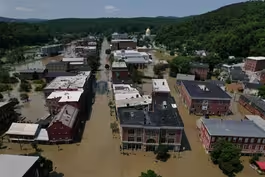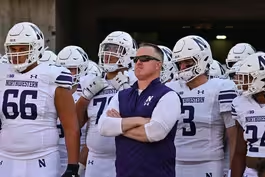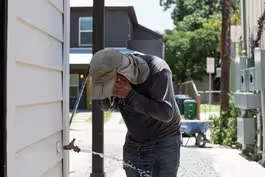
Schools, students battle learning gaps worsened by pandemic
Clip: 7/11/2023 | 6m 27sVideo has Closed Captions
Schools and students face difficult battle to close learning gaps worsened by pandemic
Billions of dollars were funneled to school districts across the U.S. to help them make up for learning loss from the pandemic. But new research shows that even with that extra money, school districts are still struggling to close the gaps in reading, writing and math. Stephanie Sy discussed the findings with Karyn Lewis of the Center for School and Student Progress and a lead researcher at NWEA.
Problems playing video? | Closed Captioning Feedback
Problems playing video? | Closed Captioning Feedback
Major corporate funding for the PBS News Hour is provided by BDO, BNSF, Consumer Cellular, American Cruise Lines, and Raymond James. Funding for the PBS NewsHour Weekend is provided by...

Schools, students battle learning gaps worsened by pandemic
Clip: 7/11/2023 | 6m 27sVideo has Closed Captions
Billions of dollars were funneled to school districts across the U.S. to help them make up for learning loss from the pandemic. But new research shows that even with that extra money, school districts are still struggling to close the gaps in reading, writing and math. Stephanie Sy discussed the findings with Karyn Lewis of the Center for School and Student Progress and a lead researcher at NWEA.
Problems playing video? | Closed Captioning Feedback
How to Watch PBS News Hour
PBS News Hour is available to stream on pbs.org and the free PBS App, available on iPhone, Apple TV, Android TV, Android smartphones, Amazon Fire TV, Amazon Fire Tablet, Roku, Samsung Smart TV, and Vizio.
Providing Support for PBS.org
Learn Moreabout PBS online sponsorshipbillions of dollars were funneled to school districts across the United States to help them make up for learning loss from the pandemic but new research shows that even with that extra money school districts are still struggling to close the gaps in Reading Writing and math That Grew during the pandemic Stephanie Sai has more on these findings and where we go from here Amna This research analyzed data from more than six and a half million public school students in third through eighth grades comparing their academic gains from 2022 to 2023 with pre-pandemic years the study authors estimate that most students would need on average an additional four and a half months of math instruction and four months of reading instruction to catch up I'm joined Now by Karen Lewis director of the center for school and student progress and a lead researcher at nwea the organization that came out with this new study Karen thank you so much for joining the NewsHour we know from previous even Recent research that public schools are having a tough time closing that learning Gap that occurred during the pandemic how does your study add to what we already know I think what's new about what we've learned in this most recent release of data is that up until this point we had seen some positive signs that we were starting to have some progress towards recovery albeit modest progress so it's disheartening and disappointing that at the end of the 22-23 school year we actually have backslids slightly and the gaps between current achievement levels relative to pre-pandemic Trends actually widened and that's because students were making gains this year at below average rates one of the startling statistics in your analysis is you say the average 8th grader needs more than nine months to catch up in math that's a whole Academic Year so what should schools be doing that they haven't been to make this happen I don't think it's necessarily that schools need to be doing things they haven't been they just need to be doing more of what they are doing what we're seeing here are levels of Unfinished learning that will take many years to recoup this isn't a strategy where we have one single Silver Bullet that's going to get us out of this mess and it's going to be a matter of layering interventions that are evidence-based and being able to provide those in a longer time frame what kind of interventions are we talking about and have those interventions been affected by the Staffing shortages at schools that we've been reporting on since the pandemic the interventions all share in common that they're trying to add back in some of that instruction that was lost during the initial phase of the pandemic when schools shut down so these are strategies like summer school or double dosing core instruction and reading and math we also know that high dosage tutoring is a popular intervention that's happening right now and all of those strategies rely on humans to deliver them so you're right that Staffing shortages really impede our ability to deliver these at scale we also know that any one single intervention is not going to be enough to get kids where we want them to be and it's a matter of layering these and coming up with a suite of resources to support kids you know reading through your policy recommendations you do use this phrase high dosage tutoring how do you scale that I mean are there any Innovations or ideas for how to do that given that so many students need this extra help I think it's time to get really creative about how we're finding access to tutors and it's not just putting out a help wanted ad but really getting creative and going and seeking out members of the community that may be uh underlooked in in their ability to help support these efforts so using high school students to connect with Elementary School students using college students to connect with high school students and so forth I think we need to think more broadly and more creatively about how to Source those positions you know some are saying that the federal government they're pointing out that the federal government government put billions of dollars to help schools recover from the pandemic and that part of that Focus was to get students back up to speed to pre-pandemic achievement does some accountability lie with how school districts spent that money in your view in my view it's too soon to really see those efforts pay off we know schools had a really challenging year and 21 22 and 22 23 was still complete with challenges in terms of Staffing and chronic absentee levels it's not as if schools are doing the wrong things they're just not doing enough of the right things and I think we need to have some empathy For What It's Like on the ground districts are not set up to be a Nimble and on the turn of a dime be able to implement a high dosage tutoring program to thousands of students it just isn't the way schooling works I think what our data suggests is that schools are doing the right things but just not enough of them and it's going to need to extend for a longer time frame and so certainly is not the time to withdraw Federal supports if anything it's time to double down and make sure that we are supporting schools so that they can sustain and ramp up these efforts in the coming years you know I was looking at a report about how globally students around the world have fallen behind and the U.S is actually not as bad as other countries and and one question I have is whether the goal posts have moved for everyone or need to move is it realistic at this point for educators and parents to expect that their children will catch up to the achievement that we were seeing pre-pandemic that's a question that I get a lot why do we continue to compare current achievement levels to pre-pandemic Trends should we just accept that this is our new normal I don't accept that this is our new normal I hope others don't because if we do that if we just shrug our shoulders and accept that kids are this much farther behind than they used to be that's problematic for the average kid but it's catastrophic for the kids that have been hardest hit which are students in high poverty areas Black and Hispanic students who are fully months and months behind where we would want them to be and that would only catch them up to pre-covered levels of inequality and I don't think we can just shrug our shoulders and accept that this is how things are can't give up on this Karen Lewis thank you so much for sharing these insights with us thank you for having me [Music]
Historic storm brings catastrophic flooding to Vermont
Video has Closed Captions
Clip: 7/11/2023 | 2m 30s | Historic storm brings catastrophic flooding to Vermont with more rain expected this week (2m 30s)
Jane Ferguson's memoir details career reporting in war zones
Video has Closed Captions
Clip: 7/11/2023 | 8m 16s | Jane Ferguson details career reporting in war zones in memoir 'No Ordinary Assignment' (8m 16s)
NATO summit starts with Ukraine seeking path to join
Video has Closed Captions
Clip: 7/11/2023 | 7m 51s | NATO summit starts with Ukraine seeking path to join alliance (7m 51s)
Non-alcoholic beverages flourish as more cut back drinking
Video has Closed Captions
Clip: 7/11/2023 | 7m 48s | Non-alcoholic beverages flourish as more Americans cut back on drinking (7m 48s)
Northwestern fires coach amid hazing and racism allegations
Video has Closed Captions
Clip: 7/11/2023 | 6m 52s | Northwestern fires football coach amid hazing and racism allegations (6m 52s)
Why extreme heat is more dangerous than many realize
Video has Closed Captions
Clip: 7/11/2023 | 6m 38s | Why extreme heat is more dangerous than many realize (6m 38s)
Providing Support for PBS.org
Learn Moreabout PBS online sponsorship
- News and Public Affairs

FRONTLINE is investigative journalism that questions, explains and changes our world.

- News and Public Affairs

Amanpour and Company features conversations with leaders and decision makers.












Support for PBS provided by:
Major corporate funding for the PBS News Hour is provided by BDO, BNSF, Consumer Cellular, American Cruise Lines, and Raymond James. Funding for the PBS NewsHour Weekend is provided by...






